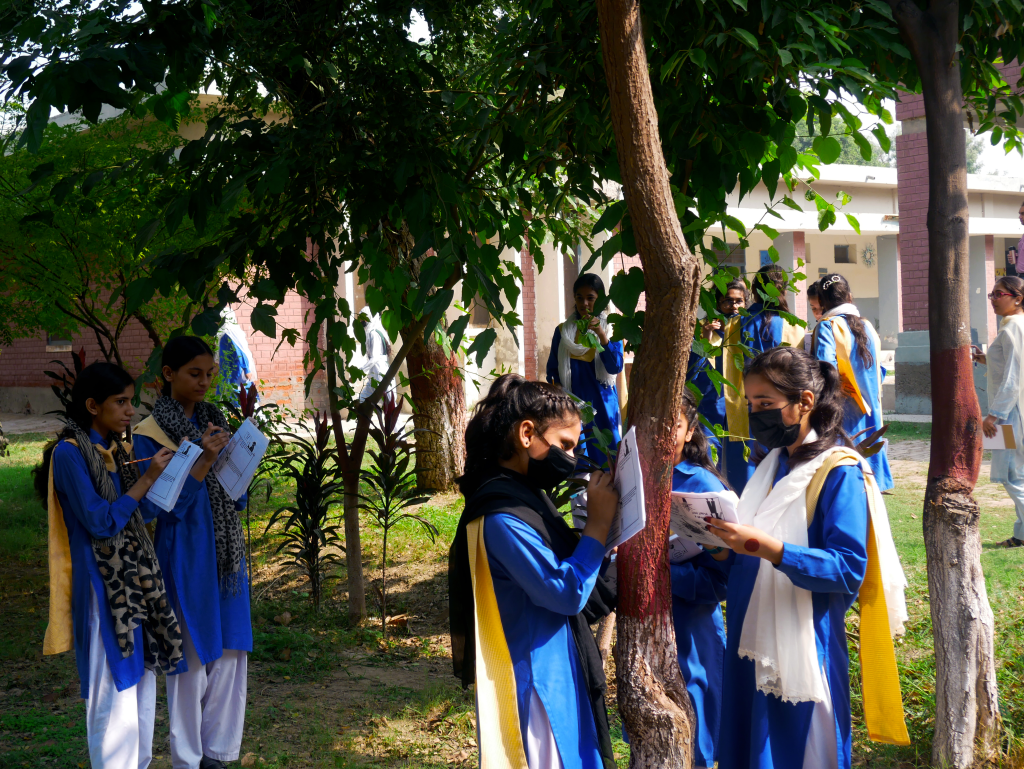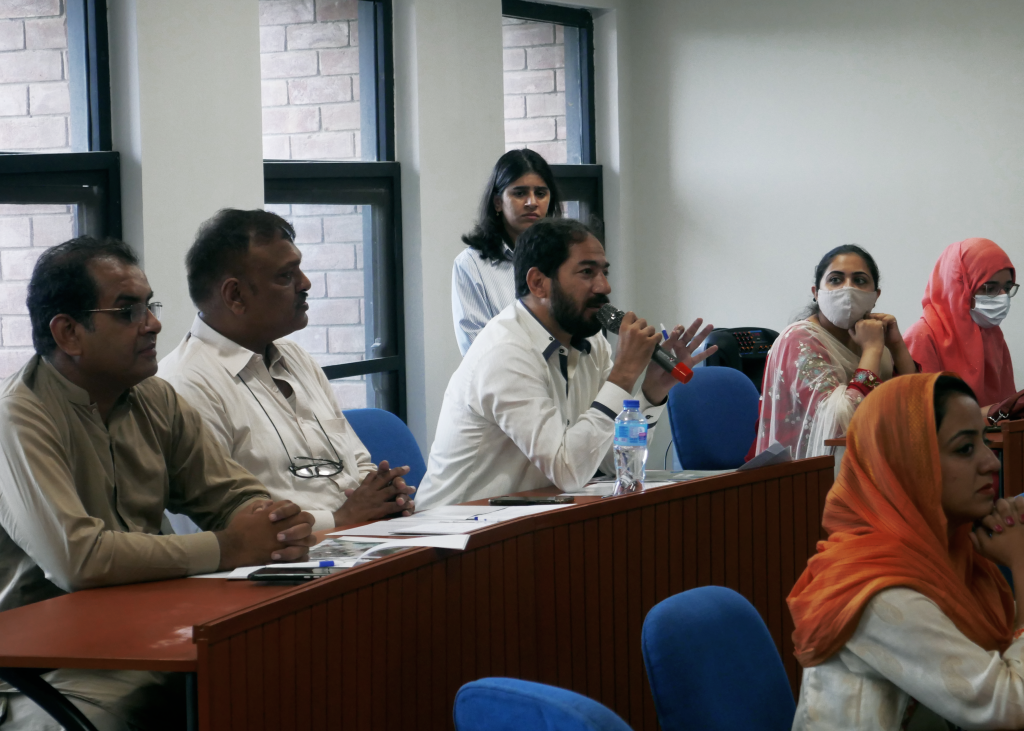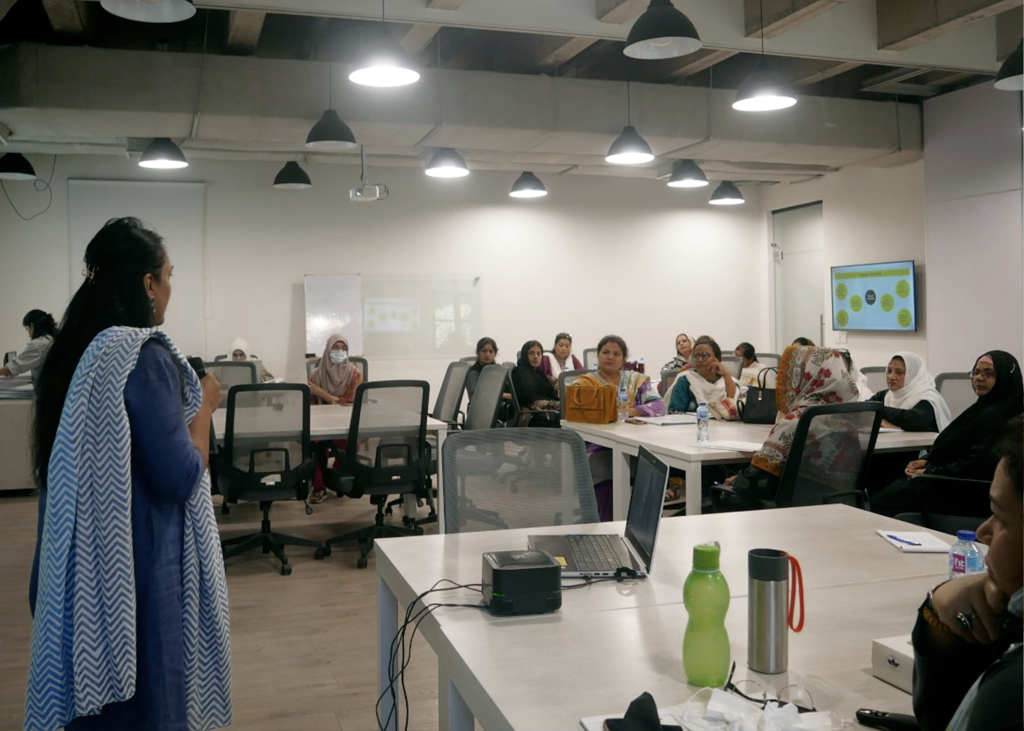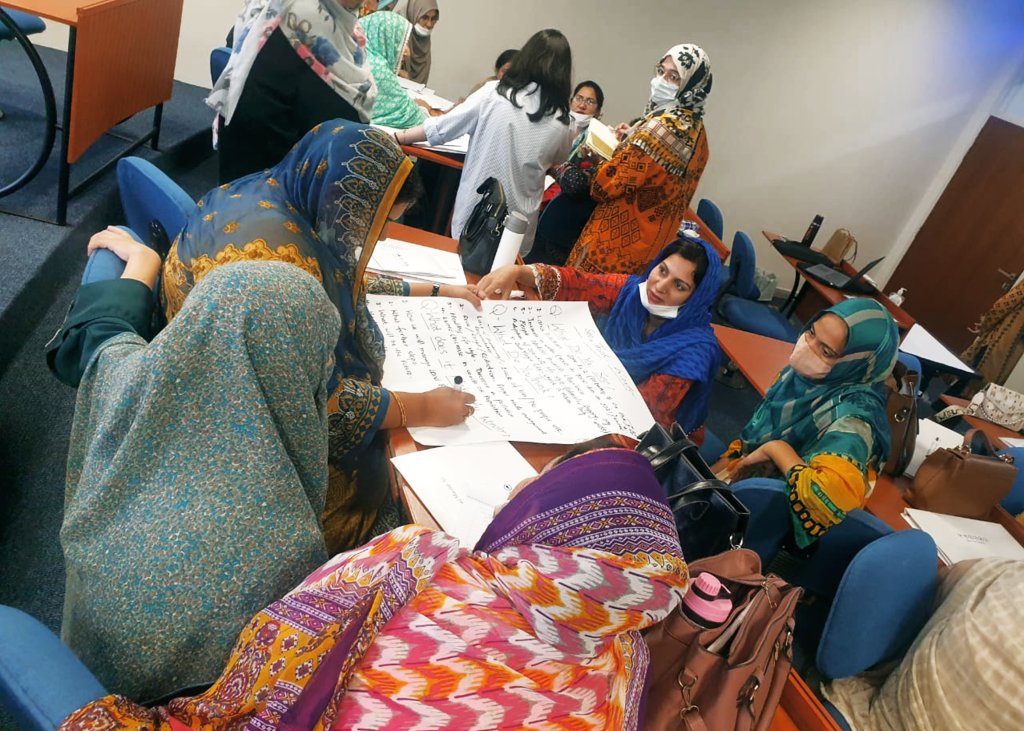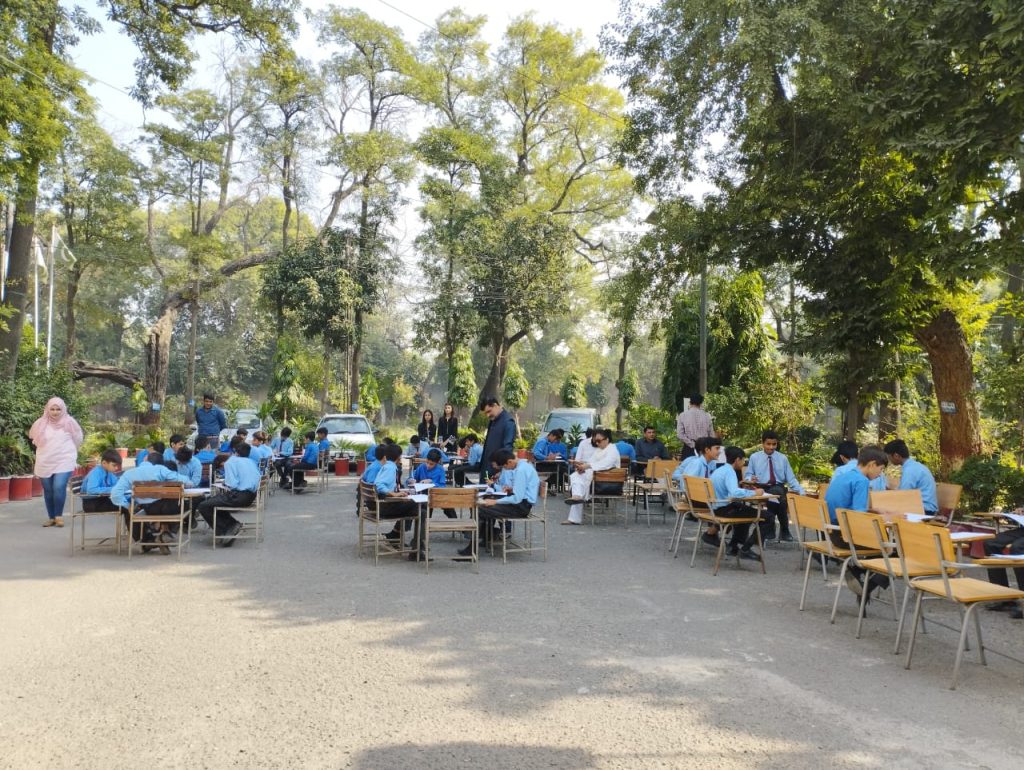The Green School Certification Program: Scalable – Pilot Project
ProgramWith great pride, LBF marks a significant milestone as the Green School Certification Program (GSCP) concludes its pilot phase.
“Once known as the City of Gardens, Lahore has lost over 70% of its tree cover and is now ranked as the most polluted city. This was exacerbated by the floods last year, the environmental crisis is adversely impacting the livelihood and health of its residents. The project functions parallel to the academic curriculum, empowering the next generation of eco-citizens through advocacy of long-term sustainable practices at community level. It supports a circular system of government bodies, educational institutions, private and social sector entities that come together to affect intergenerational transfer of climate-aware knowledge and practice.
Phase-wise findings inform a resource document, a checklist of green practices for schools and pro-environment policy recommendations that are developed with partnership of the government to impact future climate and education policies. The project structure facilitates an expansion model which can be replicated across institutions and scaled-up to other regions in Pakistan. Creating a network of eco-conscious entities that are committed to reducing their environmental impact and contributing to a more sustainable future, especially in the context of the Global South.”
Qudsia Rahim, Project Director
Project Description
The Green School Certification Program (GSCP) is a year-long initiative that seeks critical thinking and whole systems learnings on climate education and ecological practices using art-education as a pedagogical tool, with a focus on climate justice. Our aim is to establish ‘baseline – Green Schools’ by developing a comprehensive pedagogical model and promoting climate knowledge and ecological practices through a whole systems approach.
We would like to express our sincere appreciation to our invaluable partners who have made this project possible:
The World Wildlife Fund (WWF) has acted as our curriculum partner and developed the curriculum on 6 themes, which were taught by the School of Education at LUMS using the pedagogical tool, Visible Thinking Routines (VTR). LCI Chemicals (Terylene Clean) has partnered with us to recycle plastic for the project. We would also like to acknowledge the Parks and Horticulture Authority (PHA), Lahore Waste Management Company (LWMC), Youth Affairs & Sports Department, Aabroo, and Nayyar Ali Dada & Associates as our other project/institutional partners. Our project advisors, including Raza Ali Dada, Rafay Alam, Naazish Ata Ullah, Dr. Faisal Bari, Chief Patron Abdullah Khan Sumbal, Umer Rasool, and Captain Usman have been instrumental in guiding us throughout this project. We are grateful for their support.
Pilot activities
- Research-based climate change education workshops for Public School students in grades 6-8 (Middle Scools, ages 10-12).
- Continuous professional development through the Training of Trainers (ToT) model for teachers and students using Visible Thinking Routines (VTRs).
- Nature Workbooks distributed to students to reinforce knowledge from student workshops.
- Student-led Eco-Clubs to empower students to engage with environmental challenges.
- Compiling Green School policy recommendations for the government, and providing schools with a checklist of ecological practices based on project learnings.
- Zero to low Waste through the 3Rs (Reduce, Reuse, Recycle) and Upcycling.
Pilot Goals
- Facilitating a network of academics through shared knowledge and student-led Eco Clubs.
- Social media call-to-action to mobilize a new generation of changemakers – reliant on self-help, awareness, and empowerment.
- Instructional resources for and checklist of recommendations to help schools reduce their environmental impact.
- Develop and connect to young climate leaders by involving the local community in sustainable practices.
- Localize conversation about climate change through educational awareness.
- Increased biodiversity and sustainable ecology.
Project Findings
- Public schools produce low-to-negligible levels of carbon emissions and have healthy recycling habits. However, they are not equipped with rudimentary-to-expert knowledge of climate and environmental challenges. The GSCP focused on knowledge sedimentation and myth-busting through education, research projects, and practice.
- While private schools are equipped with the knowledge needed for climate action, they lack implementation and contribute to higher carbon emissions to the environment. Their waste production and recycling abilities are also affected.
Phase 2
The Environmental Protection Authority, Punjab has picked up the second phase of the Green School Certification Program, the government intends to expand the project city-wide and is presently considering a pilot program in the Shadman area. The project includes both public and private schools.
Program Brochure: Link
District Education Authority (DEA):
The District Education Authority under the Government of Punjab is responsible for the management and administration of educational institutions at the district level in Punjab, Pakistan. The District Education Authority works closely with other government agencies, educational institutions, and community stakeholders to promote educational excellence and improve student outcomes.
School of Education, Lahore University of Management Sciences (SOE. LUMS):
The LUMS Syed Ahsan Ali & Syed Maratib Ali School of Education operates at the nexus of research, policy and practice, supporting a faculty that is internationally competitive and connected.
The SOE team has pioneered the development and implementation of an outcome-based instructional plan based on the thematic framework of environmental education for schools developed by the LBF/ALG and WWF. Funded by LUMS Office of Research, the intervention uses a unique, low-cost teaching strategy known as Visible Thinking Routines designed to unfurl a child’s creative and cognitive processes. After rigorous rounds of evaluation and upon reaching the findings of the study, policy recommendations will be proposed to the Government of Punjab in the form of a Green Schools Certification policy that could be mandated in schools in the province of Punjab.
World Wide Fund for Nature – Pakistan:
World Wide Fund for Nature; WWF is recognized as one of the world’s largest conservation organizations in the world, with a global network active in more than 100 countries. WWF has contributed to developing the ecological themes for the pilot project.
Environment Protection Department Punjab:
The Environment Protection Department (EPD) in Punjab, Pakistan is a government agency responsible for protecting and conserving the environment in the province of Punjab. The department is responsible for implementing environmental policies and programs and regulating activities that may have a negative impact on the environment.
School Education Department:
School Education Department is a department of the Government of Punjab, Pakistan. The functions of the department are to perform legislation, policy formulation and planning of primary, middle, secondary and higher secondary education and maintain standards of education in these fields.
Office of the Commissioner, Lahore Division:
The Office of the Commissioner Lahore serves as the headquarter of several services and operations being carried out in the Division. The Office is responsible for the implementation of Government directives and policies in the Division through respective District Administrations.
Afforestation Lahore Group (ALG):
Since its inception in 2019, Afforestation Lahore Group is focused on engaging with various methodologies and processes of climate mitigation and environmental restoration by combining urban planning, policies, design, activism, education and community involvement. It functions as a consortium of diverse parties that excogitate, research and respond to the threat of climate change. And, the ALG, in collaboration with the Commissioner Office Lahore, the PHA and other partners, has already made strides towards improving the ecology and biodiversity of Lahore by planting the city’s first public Miyawaki Forest, the Liberty Urban Forest, and it has aided in planting more than 2,500,000 trees to date in the city of Lahore through its flagship initiative, the Give Nature A Chance Climate Action Program.
LCI Pakistan Limited / Terylene Clean:
Lucky Core Industries / LCI Pakistan Limited is a leading Pakistan-based manufacturing and trading company comprising five diverse businesses: Polyester, Soda Ash, Chemicals & Agri Sciences, Pharmaceuticals and Animal Health. Through these Businesses, the Company manufactures and trades in a wide range of products including polyester staple fibre (PSF), soda ash, general and speciality chemicals, pharmaceuticals, nutraceuticals, animal health products and agricultural products (including chemicals, field crop seeds, vegetable seeds and more). The Company also has a management stake in the infant formula business under the name of NutriCo Morinaga (Private) Limited.
Aabroo Foundation:
Aabroo Educational Welfare Organization is a non-governmental, non-profit organization based in Lahore, Pakistan. Its primary objective is to promote education and empower underprivileged children and women in the country. The organization works towards providing quality education, healthcare, and other basic necessities to children from low-income families, orphans, and child labourers. It also runs vocational training programs and skill development workshops for women to enhance their employability and financial independence.
Nayyar Ali Dada and Associates:
Nayyar Ali Dada and Associates is an architectural firm based in Lahore, Pakistan. The firm was founded by Nayyar Ali Dada, a renowned architect who has made significant contributions to the field of architecture in Pakistan and internationally. The firm specializes in the design and construction of public buildings, cultural centres, educational institutions, and residential projects. Its work is characterised by a modernist aesthetic that blends contemporary design with traditional elements and materials. Nayyar Ali Dada and Associates is committed to creating sustainable and contextually responsive architecture that reflects the cultural and social values of its clients and users. The firm has won numerous awards and accolades for its innovative and impactful designs, and its work has been featured in publications and exhibitions around the world.
Project Secretariat: Lahore Biennale Foundation (LBF)
Project Director/Founder: Qudsia Rahim (LBF)
